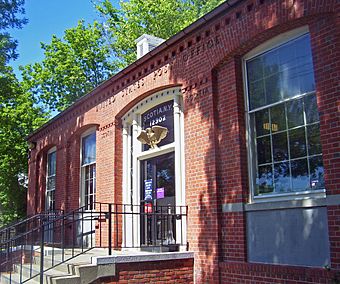United States Post Office (Scotia, New York) facts for kids
Quick facts for kids |
|
|
U.S. Post Office
|
|

West elevation, 2008
|
|
| Location | Scotia, NY |
|---|---|
| Nearest city | Schenectady |
| Built | 1939–40 |
| Architect | Louis A. Simon |
| Architectural style | Colonial Revival |
| MPS | U.S. Post Offices in New York State, 1858–1943, TR |
| NRHP reference No. | 88002430 |
| Added to NRHP | 1989 |
The U.S. Post Office in Scotia, New York, is a special old building. It sits on Mohawk Avenue in the center of the village. This post office was built in the late 1930s. It serves the 12302 ZIP Code, which includes Scotia and nearby parts of Glenville.
This building is one of five almost identical post offices in New York State. All of them have beautiful details and decorations. Inside, there is a large painting called a mural. It shows a moment from 1690 between Native Americans and an early settler family. Because of its history, the building was added to the National Register of Historic Places in 1989. In 2009, the Postal Service thought about closing it. But the community worked hard to keep it open.
Exploring the Post Office Building
The Scotia post office is on a small piece of land. It is at the corner of Mohawk and Center Street. This area is the village's downtown, with different shops and homes. The building is set back a little from the street. There are plants and landscaping in front of it.
The post office is a one-story building. It is made of brick and has a hipped slate roof. The front of the building is very balanced and pretty. It has a main entrance with a rounded arch. Above the door, there is a carved metal eagle. The words "UNITED STATES POST OFFICE" are written above the door. "SCOTIA" is written on either side.
All the windows on the building look similar. They are shaped and decorated in a matching way. The design makes them look like an arcade, which is a row of arches.
Steps made of concrete lead up to the entrance. There is also a wheelchair ramp for easy access. The original lampposts are still there, standing on their own bases. When you go inside, you enter a small wooden area called a vestibule.
The main lobby takes up most of the front of the building. The postmaster's office is in the southeast corner. Some parts of the lobby have been updated. But the original wooden customer tables are still there. The floor is made of terrazzo, which is a mix of chips and cement. The walls have marble up to counter height. On the east wall, you can see the mural. It is called The Glen Family Spared by French Indians.
A Look Back at History
In the 1800s, Scotia became known for making brooms. A small building handled the mail needs back then. In 1935, during the Depression, the government decided to build the current post office. This was part of a plan to create jobs. The new building replaced an old house and garage.
Louis A. Simon designed the Scotia post office. He was the Supervising Architect for the Treasury Department. He designed many post offices in New York during the 1930s. The Scotia design was almost the same as four other post offices. These were in Akron, Horseheads, Middleburgh, and Oxford. All these buildings are brick and have a Colonial Revival style.
Construction started in 1939. It was one of the last buildings finished under the Depression-era job programs. The local company Loucks and Clarks built it. It was completed in 1940. At first, it was considered a branch of the post office in Schenectady. That is why it was listed as "Scotia Station" on the National Register.
In 1941, an artist named Amy Jones painted the mural. It is about the Glen family being saved during the 1690 Schenectady massacre. This event was very important in Scotia's early history. Amy Jones also painted a similar mural for the Painted Post post office.
In 2009, the U.S. Postal Service (USPS) announced it might close the Scotia post office. This was because of the difficult economy at the time. The community worked together to save it. They wanted to keep it open, partly because it is a historic building. The Schenectady County legislature even passed a resolution to help. Its leader, Susan Savage, started an Internet petition. As of September 2009, the Postal Service had not removed Scotia from the list of possible closures.
 | Jackie Robinson |
 | Jack Johnson |
 | Althea Gibson |
 | Arthur Ashe |
 | Muhammad Ali |

